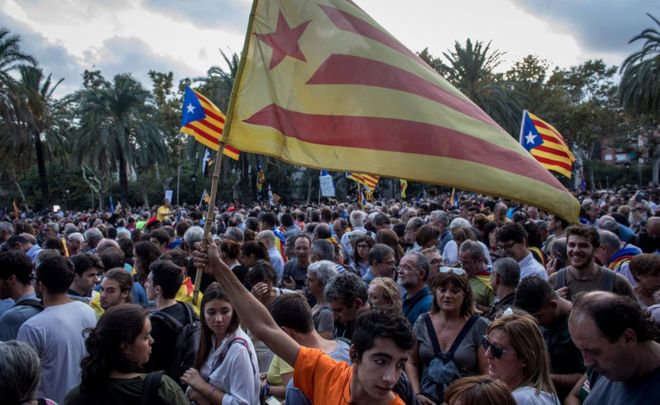The Spanish government has rejected a statement of independence signed by Catalan leader Carles Puigdemont and dismissed calls for mediation.
Spain’s deputy prime minister described Mr Puigdemont as someone “who does not know where he is, where he’s going”.
Prime Minister Mariano Rajoy is due to hold an emergency cabinet meeting to discuss the government’s next steps.
Mr Puigdemont signed a declaration of independence on Tuesday, but halted implementation to allow negotiations.
There had been speculation that the Catalan president might declare independence and put the move into effect, plunging Spain into an even deeper political crisis.
Spain has been in turmoil since a disputed referendum on 1 October which was declared invalid by the country’s Constitutional Court.
Addressing the Catalan parliament in Barcelona, Mr Puigdemont said the autonomous region had won the right to be independent as a result of the vote.
“We call on international states and organisations to recognise the Catalan republic as an independent and sovereign state,” he said.
He said the “people’s will” was to break away from Madrid, but he also said he wanted to “de-escalate” the tension around the issue.
“I propose suspending the effects of the declaration of independence to undertake talks in the coming weeks without which it is not possible to reach an agreed solution,” Mr Puigdemont told MPs.
The view from Barcelona v Madrid
Catalonia crisis: What are the options now?
He and other Catalan leaders then signed the declaration of independence. It is not clear if the declaration has any legal status.
Crowds of independence supporters in Barcelona cheered Mr Puigdemont’s initial remarks, but many expressed disappointment as he clarified his stance.
In Madrid, Spanish Deputy Prime Minister Soraya Saenz de Santamaria rejected Mr Puigdemont’s proposal for talks through an international mediator
“Neither Mr Puigdemont nor anybody else can claim… to impose mediation,” she said.
“After having come so far, and taken Catalonia to the greatest level of tension in its history, President Puigdemont has now subjected his autonomous region to its greatest level of uncertainty.
“The speech the president… gave today is that of a person who does not know where he is, where he’s going, nor who he wants to go there with.”
Puigdemont’s announcement – reaction and analysis
Spain’s Justice Minister Rafael Catala reiterated the government’s position that the referendum was illegal and its results invalid.
Almost 90% of voters backed independence with a turnout of 43%, Catalan officials say. Anti-independence voters largely boycotted the ballot and there were several reports of irregularities.
National police were involved in violent scenes as they tried to stop the vote taking place.
Reality Check: Would Catalonia be a viable country?
Catalan crisis: Six things you need to know
Ahead of Mr Puigdemont’s address on Tuesday, influential figures including Barcelona’s mayor Ada Colau and European Council President Donald Tusk had urged him to step back from declaring independence.
Catalonia is is one of Spain’s wealthiest regions, but a stream of companies has announced plans to move head offices out of Catalonia in response to the crisis.
The European Union has made clear that should Catalonia split from Spain, the region would cease to be part of the EU.
BBC

